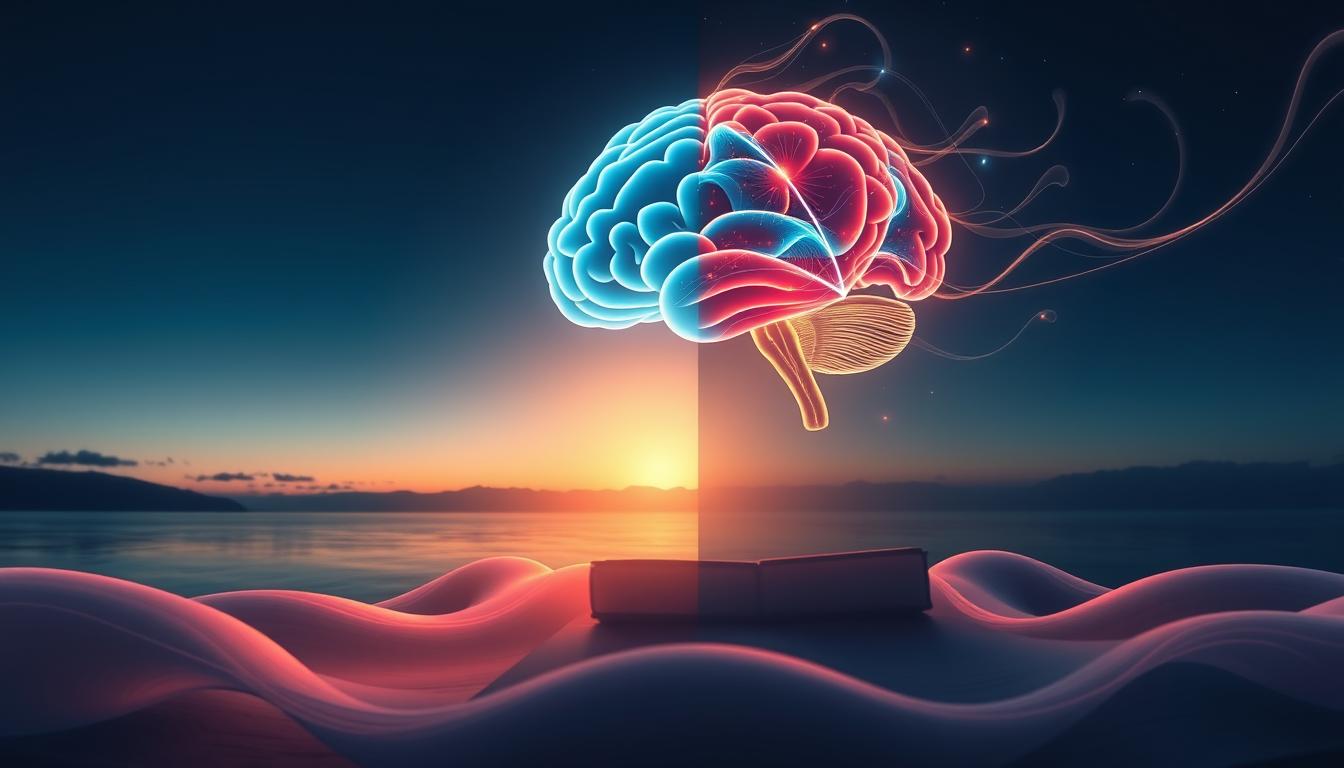Exploring the world of learning and memory, I see how my circadian rhythm matters. It affects not just when I sleep and wake but also how well I learn. Knowing how my body reacts to these rhythms is key to boosting my brain power and doing well in school.
Research shows that the connection between circadian rhythm and learning is strong. It affects our overall health and how sharp our minds are.
The Science Behind Circadian Rhythm
Circadian rhythms are like our body’s internal clock. They control important functions like sleep, hormone release, and body temperature. These rhythms follow a 24-hour cycle, which is crucial for our health.
The National Institute of General Medical Sciences explains how our body responds to light and temperature. Knowing about circadian processes helps us live in sync with our natural cycles.
Understanding the Biological Clock
My biological clock manages how I feel and perform at different times. It’s key for keeping my energy levels up. For example, I’m most productive in the late morning.
During this time, I can focus better and think more clearly. My sleep cycles and daily activities work together like a dance.
How Circadian Rhythm Affects My Daily Life
My daily life is shaped by my circadian rhythm. It affects my energy and how well I can work. I notice my energy levels change throughout the day.
This helps me plan my tasks better. I do important thinking when I’m most alert. Less demanding tasks are for when I’m feeling tired.

The Link Between Sleep and Learning
Sleep and learning are closely linked, especially with REM sleep. This stage is key for memory consolidation. My brain strengthens what I learned during the day during REM sleep.
Research shows that enough REM sleep boosts learning. It helps me understand and remember new things better.
The Role of REM Sleep in Memory Formation
REM sleep is crucial for brain growth and memory. My brain works hard while I sleep, making sure I remember what I learned. Good REM sleep improves my thinking and school work.
This shows how important sleep is for learning and remembering things.
Personal Insights on My Sleep Patterns and Learning
I’ve noticed how sleep affects my learning. Good sleep habits help me remember things better, especially on exams. Keeping track of my sleep shows me how it boosts my focus and understanding.
When I sleep well, I’m ready for new challenges and remember things better.
| Aspect | Impact of Adequate REM Sleep | Impact of Inadequate REM Sleep |
|---|---|---|
| Memory Consolidation | Enhanced retention of information | Poor recall ability |
| Learning Process | Increased understanding of material | Confusion and difficulty grasping concepts |
| Focus | Improved concentration during study | Easily distracted and unfocused |
| Cognitive Function | Sharp and clear thinking | Muddled thoughts and decision-making |
Circadian Rhythm and Learning/Memory Retention
Learning at the right time is key to remembering things better. Studies show that studying when you’re most alert boosts your memory. This timing is vital for learning well.
How Timing Influences Information Retention
Research says your brain works best at certain times. Studying hard subjects when you’re most alert helps a lot. It’s important to study when you’re most focused.
Changing study times can make a big difference. It not only helps you understand better but also makes you feel more confident in school.
Case Studies: Success Stories of Optimized Learning
Real-life stories show how changing study times can change lives. A student who studied when their body was ready saw huge grade improvements. They remembered complex stuff better.
Another group of students started studying smarter and saw big gains in school. These stories prove that timing is everything in learning.

Strategies to Enhance Learning Through Circadian Rhythm
I learned how crucial it is to have a learning schedule that fits my natural rhythm. I figured out when I do my best and planned my study times around those hours. This has really helped me learn better and stay productive.
Creating a Learning Schedule That Works for Me
Creating a schedule that fits me means knowing my daily patterns. I start by finding out when I’m most awake and ready to learn. For me, late mornings are perfect for tackling tough subjects. My day usually looks like this:
- Morning study sessions for difficult concepts
- Afternoon review sessions for lighter material
- Evening summarizing of key points learned
Tips for Aligning Study Sessions with My Peak Performance Times
To boost my productivity, I use certain strategies for my study times. These tips help me time my studies and plan my curriculum:
- Do hard tasks when I’m at my best, usually in the late morning.
- Use afternoons for easy reviews to keep things light.
- Take breaks to stay sharp and focused.
- Check and tweak my schedule often to keep improving.
By matching my study times with when I’m most alert, my learning has gotten much better. Here’s a table showing how I organize my day for learning, blending different techniques with my natural cycles.
| Time | Activity | Comments |
|---|---|---|
| 8:00 AM – 10:00 AM | Difficult Concepts | High energy, best for complex learning. |
| 10:15 AM – 11:00 AM | Problem Solving | Engaging tasks to maintain focus. |
| 1:00 PM – 2:30 PM | Review Sessions | Revisiting material while refreshed. |
| 3:00 PM – 4:00 PM | Summarization | Consolidating knowledge for retention. |

Dietary Considerations for Cognitive Function
Eating right is key to keeping my brain sharp. I choose foods that help my brain work better. These foods support learning and memory.
Food That Fuels My Brain
Some foods are better than others for my brain. Here are a few:
- Fatty fish, like salmon and mackerel, are full of omega-3s that are good for my brain.
- Leafy greens, such as spinach and kale, give me important vitamins and minerals.
- Berries, especially blueberries, are packed with antioxidants that help my memory.
Research shows these foods help me stay focused and remember things better. They’re a big part of what I eat. Eating them regularly has really helped my learning.
The Best Timing for Meals to Boost Learning
When I eat is just as important as what I eat. Eating a balanced meal before studying helps me stay focused. I plan my meals to match my study schedule. Here’s how I do it:
| Meal | Time | Benefits |
|---|---|---|
| Breakfast | 7:00 AM | Provides energy and nutrients for optimal morning focus. |
| Lunch | 12:00 PM | Replenishes energy levels before afternoon study sessions. |
| Snack | 3:00 PM | Maintains blood sugar levels to enhance concentration. |
| Dinner | 6:00 PM | Helps recovery and prepares me for the next day’s learning. |
This way of eating has really helped me learn new things. It shows how important good nutrition is for learning.
Mindfulness and its Role in Circadian Rhythm
Adding mindfulness to my daily life has greatly improved my well-being and thinking skills. Through meditation and breathing exercises, I reduce stress and boost mental clarity. This makes learning easier and more effective.
Studies show that mindfulness can sync with my body’s natural rhythm. This improves my mood and brain health. It helps me learn better when my brain is most ready.
Regular mindfulness helps me feel less anxious and more focused. This better mental state improves my school work and daily life. Understanding the link between mindfulness and my natural rhythm is key to better learning.

